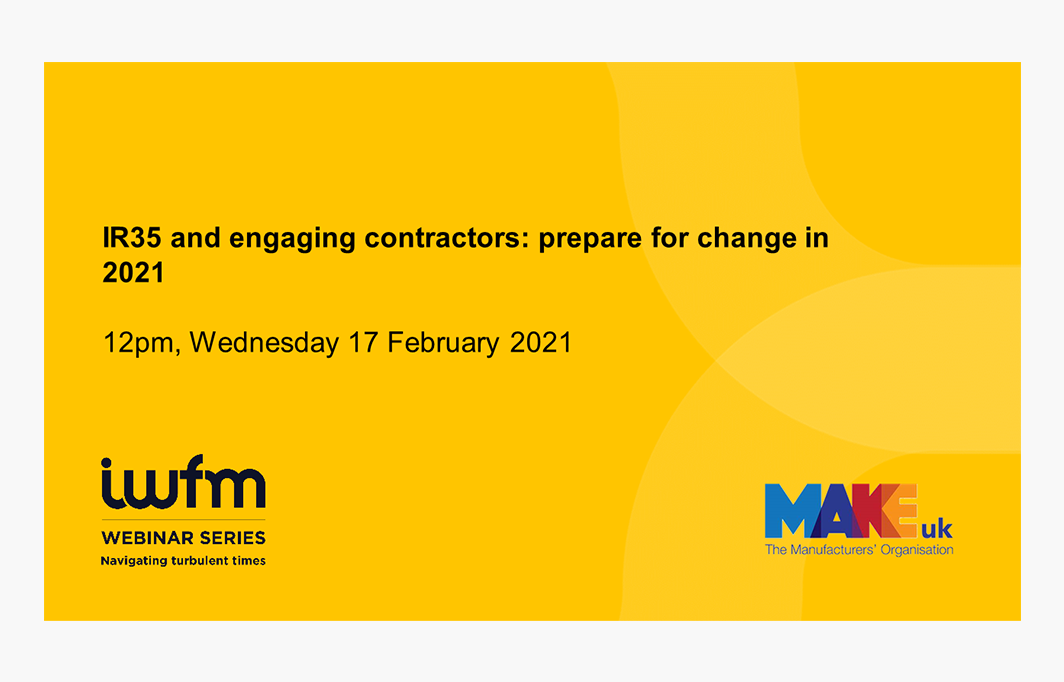Your questions answered for ‘Navigating turbulent times: IR35 and engaging contractors: prepare for change in 2021’ with Make UK
News
- General news
23 February 2021

Episode 36 of our flagship webinar series, ‘Navigating turbulent times’, welcomed solicitor Sarah Brett from Make UK for the first of three briefings focused on key changes happening to the business and legal operating environment in 2021.
Last Wednesday’s session (17 February) covered IR35, which regards a change in the law to ‘off-payroll’ working rules for contractors engaged through their own limited (or personal services) company coming in April. You can watch the episode now by clicking here.
As there wasn’t enough time to answer every question we received during the webinar, Sarah kindly agreed to provide answers after the fact. Please scroll down to see her answers to our attendees’ questions.
Disclaimer: any advice provided is for training purposes only based on limited facts and cannot be relied on for legal and tax purposes.
Question 1:
‘Would it be considered reasonable to introduce in the Disputing Process a limit on the number/frequency of status disputes and/or a deadline for the worker to formalise a disagreement with the SDS issued by the company (i.e. if you disagree with the SDS, you need to state this in writing within 7 days from the day the SDS is received, no more than 1 dispute in any rolling year).’
Sarah Brett:
‘I don't think you can place a limit on number of appeals. In practice, you would just bring the retainer to an end if the relationship with the personal service company is not working.’
Question 2:
‘If payment is being made against milestones and outcomes, where the contractor is taking the risk on what input is required to deliver the outcome/milestone, is this off payroll?’
Sarah Brett:
‘It is indicative of the contractor being off payroll. You still need to apply all the other tests, too, to come to an overall outcome.’
Question 3:
‘Is there a threshold of the hours worked for a client which then deems you out of IR35?’
Sarah Brett:
‘No, there is not a threshold.’
Question 4:
‘As an end user who contracts with large FM service providers, who in turn will have contracts with multiple subcontractors (some of which may be self employed) - does the liability sit with myself or the FM service provider?’
Sarah Brett:
‘It is the end user's responsibility to check the correct tax status.’
Question 5:
‘What about sole traders completing or competing to provide services, e.g. a repair or refurbishment?’
Sarah Brett:
‘These rules do not apply if there is no intermediary.’
Question 6:
‘Who has the responsibility to identify an intermediary for the purposes of managing the off-payroll obligations?’
Sarah Brett:
‘It is the end user's responsibility to identify a personal service company.’
Question 7:
‘Is IR35 relevant to agency staff?’
Sarah Brett:
‘You need to see the documentation they have with the worker to see if they have a direct relationship with the worker/employee/self-employed person or whether there is personal service company (typically a limited company) involved. If it is the latter and their contract is with a personal service company, then this is a potential IR35 situation, in which case you will need to do a CEST test unless they have already applied PAYE.’
Our next episodes with Make UK will take place on Wednesday 10 March, covering EU travel and the right to work, and Wednesday 31 March, covering employment law. Bookmark our Events page and check back often for further information and to register your place.
